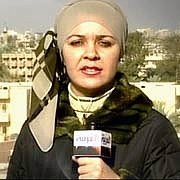Iraqi Journalists Add Laws to List of Dangers
 Iraqi journalist Atwar Bahjat al-Samerai, who was assassinated in the central city of Samarra in February
Iraqi journalist Atwar Bahjat al-Samerai, who was assassinated in the central city of Samarra in FebruaryBAGHDAD — Ahmed al-Karbouli, a reporter for Baghdadiya TV in the violent city of Ramadi, did his best to ignore the death threats, right up until six armed men drilled him with bullets after midday prayers.
He was the fourth journalist killed in Iraq in September alone, out of a total of more than 130 since the 2003 invasion, the vast majority of them Iraqis. But these days, men with guns are not Iraqi reporters’ only threat. Men with gavels are, too.
Under a broad new set of laws criminalizing speech that ridicules the government or its officials, some resurrected verbatim from Saddam Hussein’s penal code, roughly a dozen Iraqi journalists have been charged with offending public officials in the past year.
Currently, three journalists for a small newspaper in southeastern Iraq are being tried here for articles last year that accused a provincial governor, local judges and police officials of corruption. The journalists are accused of violating Paragraph 226 of the penal code, which makes anyone who “publicly insults” the government or public officials subject to up to seven years in prison.
On Sept. 7, the police sealed the offices of Al Arabiya, a Dubai-based satellite news channel, for what the government said was inflammatory reporting. And the Committee to Protect Journalists says that at least three Iraqi journalists have served time in prison for writing articles deemed criminally offensive.
The office of Prime Minister Nuri Kamal al-Maliki has lately refused to speak with news organizations that report on sectarian violence in ways that the government considers inflammatory; some outlets have been shut down.
In addition to coping with government pressures, dozens of Iraqi journalists have been kidnapped by criminal gangs or detained by the American military, on suspicion that they are helping Sunni insurgents or Shiite militias. One, Bilal Hussein, who photographed insurgents in Anbar Province for The Associated Press, has been in American custody without charges since April.
And all Iraqi journalists have to live with the fear of death, which often dictates extreme security measures. Abdel Karim Hamadie, the news manager for Al Iraqiya Television, said he sometimes went months without leaving the station’s compound.
“The last time I went home was three weeks ago,” he said, showing off a small room adjacent to his office where he sleeps each night. “Before that, I spent three months at work. I used to hit my chair because I was so angry. But then I got a new chair.”
Read the rest at the NY Times
Related Link:
U.S. holds AP photographer in Iraq 5 mos (Bilal Hussein)
Related Link:
Arabiya ban spotlights Iraq's tense media relations

<< Home